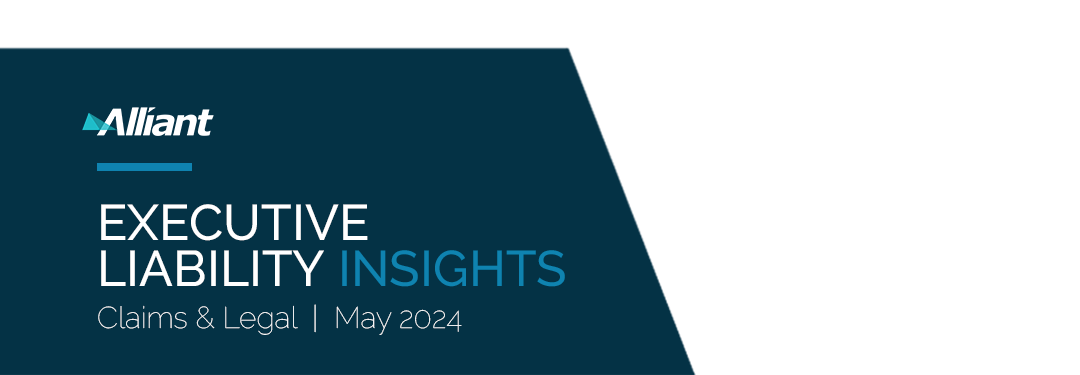
Navigating today’s complex risk environment can be a monumental task. Steve Shappell, Alliant Claims & Legal, spearheads Executive Liability Insights, a monthly review of news, legal developments and information on executive liability, cyber risk, employment practices liability, class action trends and more.


FEATURED ARTICLE
DELAWARE CLARIFIES CONTROLLING STOCKHOLDERS’ FIDUCIARY DUTIES
In re Sears Hometown and Outlet Stores, Inc. S’holder Litig., C.A. No. 2019-0798-JTL (Del. Ch. Jan. 24, 2024).
A Delaware court, clarifying the fiduciary duties of controlling stockholders when exercising stockholder-level voting power, found a controlling stockholder owes a duty of good faith to not intentionally harm the corporation or its minority stockholders, as well as a duty of care to refrain from grossly negligent action.
In This Issue:
NO COVERAGE UNDER E&O POLICY FOR A PAYMENT TO GOVERNMENT AGENCY FOLLOWING AN INVESTIGATION
Diamond Residential Mortg. Corp. v. Liberty Surplus Ins. Corp., 19 CV 06439 (N.D. Ill. Mar. 25, 2024).
A court held that an insurance carrier (the “Carrier”) did not have to provide coverage for an insured’s payment to a state government agency (the “Agency”) following an investigation of alleged fraudulent business practices.
Read More >>
SECURITIES CLASS ACTION AND SUBSEQUENT GOVERNMENT INVESTIGATIONS ARE NOT RELATED; TWO POLICY PERIODS TRIGGERED TO COVER LOSS
Endurance Am. Inc. Co.; et al. v. Under Armour, Inc., RDB-22-2481 (D. Md. Mar. 26, 2024).
A large retailer (the “Insured”) submitted a Securities Class Action and certain derivative lawsuits for coverage to its D&O program, (the “Carriers”). Months later, the Insured received notice of investigations commenced by the SEC and DOJ as well as a Wells Notice and a series of derivative demands.
Read More >>
IN ESOP LITIGATION, DUTY TO DEFEND LASTS AS LONG AS COVERED ALLEGATIONS DO, EVEN IN LIGHT OF OVERBROAD EXCLUSIONS
Great Am. Fid. Ins. Co. v. Stout Risius Ross, Inc., 2024 U.S. App. LEXIS 8576 (6th Cir., 8 Apr. 2024).
In a lawsuit filed by a paper manufacturer (the “Manufacturer”) against a financial advisor company (the “Company”), the court clarified that the duty to defend applied over broadly worded exclusionary language as long as at least one allegation fell within the covered scope of the insurance policy.
Read More >>
BAD FAITH ALLEGATION BY INSURED REQUIRED TO TRIGGER COVERAGE UNDER INSURANCE COMPANY'S PROFESSIONAL LIABILITY POLICY
Columbia Cas. Co. v. State Auto. Mut. Ins. Co., 2024 U.S. Dist. LEXIS 56990 (S.D. Ohio Mar. 28, 2024).
A court, applying Ohio law, held that a bad faith allegation made by a third-party against an insurance company (the “Company”) for mishandling the defense of its insured in a Florida wrongful death lawsuit does not constitute a claim under its errors and omissions liability policy.
Read More >>
BANKRUPTCY COURT DECISION ALLOWS CREDITOR’S COMMITTEE DERIVATIVE ACTIONS AGAINST INSOLVENT LLC DEBTORS
In re Pack Liquidating LLC, No. 22-10797 (Bankr. D. Del. Feb 2, 2024).
The U.S. Bankruptcy Court for the District of Delaware set a new precedent by granting authority to creditors’ committees derivative standing to assert claims belonging to the estate in cases involving debtor limited liability companies (LLCs). This is a departure from prior decisions, where courts held that creditors of an insolvent LLC debtor were not permitted to bring a derivative action on behalf of the LLC.
Read More >>
THIRD CIRCUIT LOWERS STANDARD OF REVIEW FOR SHAREHOLDER DERIVATIVE SUITS
In re Cognizant Tech. Sols. Corp. Derivative Litig., 2024 U.S. App. LEXIS 10902 (3d Cir. May 3, 2024).
The Third Circuit lowered the standard of review for dismissals of shareholder derivative actions for failure to plead demand futility. The change allows the appeals court to decide demand futility without deference to the lower court and aligns it with other Circuit Courts.
Read More >>
NON-ACTION AND PRIOR ACTS CLAUSES BAR D&O COVERAGE
Origis USA LLC v. Great Am. Ins. Co., 2024 Del. Super. LEXIS 383 (May 9, 2024)
A Delaware court ruled in favor of insurance carriers (the “Carriers”) and dismissed a coverage lawsuit filed by a company and its CEO (the “Insureds”) who sought coverage under two different Directors and Officers (“D&O”) policies. The court based its dismissal on the existence of a “Non-Action” clause in the prior policy period and the “Prior Acts” exclusions in the renewal policy period.
Read More >>
CYBER CORNER
Click to read the following cases:
- NEWLY DRAFTED FEDERAL BILL AIMS TO STRENGTHEN CONSUMER PRIVACY RIGHTS
Read More >>
EMPLOYMENT CORNER
Click to read the following cases:
- MORE PROTECTIONS FOR WOMEN UNDER THE PREGNANT WORKERS FAIRNESS ACT
- TITLE VII REQUIRES SOME (BUT NOT A LOT) OF HARM, SAID THE SUPREME COURT
- NO COVERAGE FOR SUBSEQUENT INTERRELATED LAWSUIT
- FTC’S NONCOMPETE BAN AND ITS CURRENT EFFECT ON BUSINESSES
- DEPARTMENT OF LABOR ISSUES NEW OVERTIME RULE THAT RAISES SALARY THRESHOLDS
- THE DOL EXPANDS THE REACH OF ERISA BY BROADENING THE MEANING OF AN INVESTMENT ADVICE FIDUCIARY
- A WIN FOR CALIFORNIA EMPLOYERS WHO CAN ASSERT GOOD FAITH DEFENSE FOR WAGE STATEMENT PENALITIES
Read More >>
SECURITIES CORNER
Click to read the following cases:
- U.S. SUPREME COURT HOLDS THAT OMISSION OF REQUIRED DISCLOSURES ARE INSUFFICIENT TO PLEAD SECURITIES FRAUD
- APRIL 2024 NOTEWORTHY ENFORCEMENT ACTIONS FILED
- APRIL 2024 NOTEWORTHY SETTLEMENTS AND JUDGEMENTS
Read More >>
SHAREHOLDER CORNER
Click to read the following cases:
- APRIL 2024 SECURITIES CLASS ACTION FILINGS
Read More >>
DELAWARE CLARIFIES CONTROLLING STOCKHOLDERS’ FIDUCIARY DUTIES
In re Sears Hometown and Outlet Stores, Inc. S’holder Litig., C.A. No. 2019-0798-JTL (Del. Ch. Jan. 24, 2024).


A Delaware court, clarifying the fiduciary duties of controlling stockholders when exercising stockholder-level voting power, found a controlling stockholder owes a duty of good faith to not intentionally harm the corporation or its minority stockholders, as well as a duty of care to refrain from grossly negligent action.
A committee of independent directors for a retail company (the “Company”) endorsed a plan to liquidate one of its failing business segments and thereafter, continue operation of its successful segment. The Company’s controlling shareholder, believing the plan was flawed, took steps to prevent its implementation. Those steps included adopting bylaws, replacing committee members, and acquiring the minority stockholders’ interests in a squeeze-out transaction.
The minority stockholders filed a complaint for breach of fiduciary duty against the controlling shareholder. The court determined that when a “controller” exercises their voting power to impair the rights of the board or a stockholder minority, the “controller” must act in good faith to achieve a legitimate objective, must use reasonable means, and must have a reasonable basis for believing those means are necessary.
The court found that the controlling stockholder did not breach any fiduciary duty in blocking the transaction because there was a good-faith belief that the transaction could be value-destructive, and the means utilized were reasonable. However, since the “controller” was unable to show that the conflicted squeeze-out transaction was fair for the minority stockholders, there was a finding of liability with respect to that allegation.
NO COVERAGE UNDER E&O POLICY FOR A PAYMENT TO GOVERNMENT AGENCY FOLLOWING AN INVESTIGATION
Diamond Residential Mortg. Corp. v. Liberty Surplus Ins. Corp., 19 CV 06439 (N.D. Ill. Mar. 25, 2024).


A court held that an insurance carrier (the “Carrier”) did not have to provide coverage for an insured’s payment to a state government agency (the “Agency”) following an investigation of alleged fraudulent business practices. The court held that the Errors and Omissions Policy (the “policy”) purchased by the insured, a mortgage lender (the “Lender”), did not extend coverage to the Lender following the state investigation.
Following an investigation of the Lender for alleged fraudulent business practices, the Agency sent a letter to the Lender with the terms that would resolve the investigation. As part of the resolution, the Lender entered into a “Consent Order” and an “Assurance of Voluntary Compliance” with the Agency and agreed to pay a large penalty. The Lender timely noticed the investigation to the Carrier, however, the Carrier denied coverage.
The Carrier argued that the payment made by the Lender related to a disciplinary proceeding and did not constitute a claim. The policy defined a Disciplinary Proceeding as “any proceeding commenced by a regulatory or disciplinary official, board or agency to investigate charges of professional misconduct in the performance of Professional Services.” Furthermore, the policy clarified a “Claim shall not mean a Disciplinary Proceeding.” The court determined that the Lender’s loss, brought on by a regulatory agency’s investigation, is consistent with a disciplinary proceeding and therefore not covered.
The Carrier argued that the payment constituted a fine or penalty, rather than damages. The Lender, however, argued that the payment was part of a “negotiated settlement” and falls under the policy’s definition of damages. The court drew the inference that the Lender’s payment constituted a fine or penalty from the Agency’s authorizing statute and language in the Consent order, as well as the language in the Assurance of Voluntary Compliance which stated the Agency would transfer “fine monies received from [the Lender].”
Lastly, the Carrier argued that an Exclusion in the policy excluded claims brought by government agencies. The Exclusion stated that it “does not apply to and [the Carrier] shall not be liable for Damages and/or Claims Expenses resulting from any Claim made against an Insured . . . brought by or on behalf of any federal, state or local government or agency, or bureau thereof.” While the Lender attempted to argue that it fell into one of the exceptions, the court quickly sided with the Carrier because the claim was brought against the Lender by the Agency and the Exclusion “clearly and unambiguously addresses the limited situation where a government entity is the client of the insured and brings a Claim of its own against the insured.” The court concluded that the exclusion independently barred coverage for the Lender’s claim because it was brought by government entities.
SECURITIES CLASS ACTION AND SUBSEQUENT GOVERNMENT INVESTIGATIONS ARE NOT RELATED; TWO POLICY PERIODS TRIGGERED TO COVER LOSS
Endurance Am. Inc. Co.; et al. v. Under Armour, Inc., RDB-22-2481 (D. Md. Mar. 26, 2024).


A large retailer (the “Insured”) submitted a Securities Class Action and certain derivative lawsuits for coverage to its D&O program, (the “Carriers”). Months later, the Insured received notice of investigations commenced by the SEC and DOJ as well as a Wells Notice and a series of derivative demands. The Insured provided notice of the investigations to its D&O program under a subsequent Policy Period.
The Carriers argued that only one Policy Period was implicated because the subsequently tendered letters, investigations, and prosecution documents related back to a Claim first made when the initial Securities Class Action was submitted for coverage. The Carriers relied on the definition of Interrelated Wrongful Acts, Specific Investigation Exclusion endorsements, and the Prior Notice Exclusion. The Insured disagreed and argued that two Policy Periods were triggered, and the Insured could use proceeds from each D&O program to cover Loss in connection with the various pending matters.
Specifically, the Insured argued that the allegations in the original class action were separate and distinct from allegations contained in the governmental matters, the Wells Notice and the related derivative demands.
The court agreed with the Insured and found that coverage was not limited to one Policy Period. First, the court determined that exclusionary endorsements impacted the related Claim analysis because such endorsements conflicted with the main body of the Policy and narrowed the scope of the insurers’ Single Claim argument. Second, the court found that the allegations in the original Securities Class Action involved alleged “false and overly optimistic” statements about future earnings but that the subsequent claim documents focused on sales and accounting practices.
In deciding in favor of the Insured, the court concluded that the class action plaintiffs and government investigation involved “different parties, focus[ed] on overlapping, but not identical, time periods, raise[d] different theories of liability, rel[ied] on different evidence, and [sought] different relief.”
IN ESOP LITIGATION, DUTY TO DEFEND LASTS AS LONG AS COVERED ALLEGATIONS DO, EVEN IN LIGHT OF OVERBROAD EXCLUSIONS
Great Am. Fid. Ins. Co. v. Stout Risius Ross, Inc., 2024 U.S. App. LEXIS 8576 (6th Cir., 8 Apr. 2024).
In a lawsuit filed by a paper manufacturer (the “Manufacturer”) against a financial advisor company (the “Company”), the court clarified that the duty to defend applied over broadly worded exclusionary language as long as at least one allegation fell within the covered scope of the insurance policy. However, when covered allegations were dropped from the amended complaint, the carrier’s duty to defend ceased.


The Company faced two lawsuits both of which stemmed from financial advisory services the Company provided to the Manufacturer in valuing the Manufacturer’s stock price for the operation of the Employee Stock Ownership Plan (“ESOP”). The plan was governed by ERISA and, according to the complaint, the Company overvalued the stock and induced the Manufacturer’s employees to invest their retirements in ESOP. The Company submitted these lawsuits to its professional liability carrier (the “Carrier”).
The Carrier initially recognized its duty to defend the Company; however, it reserved rights to seek reimbursement if it had no duty to defend or indemnify the Company. Later, the Carrier filed a lawsuit, asking the court to declare that the Carrier had no duty to indemnify the Company in the litigation due to the broadly worded ERISA exclusion. The exclusion denied coverage for any claim “based on or arising out of actual or alleged violation of: (1) The Employee Retirement Income Security Act of 1974; (2) The Securities Act of 1933 . . . .” As the common law claims of fraud and negligent misrepresentations were not caused by ERISA violation claims and could have been alleged separately, the court concluded that the broad exclusionary wording did not bar the Carrier’s duty to defend.
After an amended complaint was filed and all covered common law allegations were dropped from it, the Carrier once again sought a declaration that it had no duty to defend the Company. The court held that the Carrier had the duty to defend the action while the covered claims were pending against the Company. However, the duty to defend ceased once the only remaining allegation was specifically excluded from coverage. The court determined that the Company had to reimburse the Carrier for all defense costs spent from the date the covered allegations were dropped from the action.
BAD FAITH ALLEGATION BY INSURED REQUIRED TO TRIGGER COVERAGE UNDER INSURANCE COMPANY'S PROFESSIONAL LIABILITY POLICY
Columbia Cas. Co. v. State Auto. Mut. Ins. Co., 2024 U.S. Dist. LEXIS 56990 (S.D. Ohio Mar. 28, 2024).


A court, applying Ohio law, held that a bad faith allegation made by a third-party against an insurance company (the “Company”) for mishandling the defense of its insured in a Florida wrongful death lawsuit does not constitute a claim under its errors and omissions liability policy. The Company agreed to defend its client in the wrongful death suit and initially refused to settle for the policy limits, despite a warning of excess exposure. The demand was later increased to five times the limit (the “excess demand”) and warned of a potential bad faith claim, yet the Company still refused to settle. The excess demand was accepted by the Company’s E&O carrier as notice of a potential adverse verdict and Wrongful Act that could give rise to a future Claim.
The wrongful death suit proceeded to trial and a jury awarded a verdict well in excess of the policy limits, which the Company paid with interest. The Company then sought coverage for the portion of the judgment that exceeded its client’s policy limit. The carrier denied coverage because the client never brought a bad faith claim against the Company. The parties agreed the excess demand was not a claim when it was received, but the Company argued it ripened into a claim when the excess verdict was rendered.
The court disagreed, finding the Company had not incurred a "Loss" stemming from a "Claim". The excess demand was to settle claims against the client, not the Company, and the Company was not a party to the wrongful death suit. The court found that, although the judgment may have triggered an actionable liability against the Company for bad faith, there was no evidence that the client made any threats of litigation or demands against the Company based on bad faith liability after the judgment was entered. No legal obligations could arise without the Company’s bad faith liability being determined and therefore no “Loss” was incurred.
BANKRUPTCY COURT DECISION ALLOWS CREDITOR’S COMMITTEE DERIVATIVE ACTIONS AGAINST INSOLVENT LLC DEBTORS
In re Pack Liquidating LLC, No. 22-10797 (Bankr. D. Del. Feb 2, 2024).


The U.S. Bankruptcy Court for the District of Delaware set a new precedent by granting authority to creditors’ committees derivative standing to assert claims belonging to the estate in cases involving debtor limited liability companies (LLCs). This is a departure from prior decisions, where courts held that creditors of an insolvent LLC debtor were not permitted to bring a derivative action on behalf of the LLC.
Derivative actions are claims that shareholders can pursue “on behalf of the corporation, that the corporation itself could have enforced in court,” with the purpose of preventing injustice when a corporation’s rights and interests would not be protected due to inaction by the board of directors. Under the Delaware Limited Liability Company Act (DLLCA), “[a] member or an assignee of a limited liability company interest may bring an action in the Court of Chancery in the right of an LLC to recover a judgment…” Until recently, courts have held that a creditor of the insolvent LLC debtor is not permitted to bring a derivative action in the name of the LLC because the creditor is not a member or an assignee of the LLC.
Following a recent decision by the U.S. Court of Appeals for the Third Circuit, the court held that the bankruptcy court’s authorization of a creditor’s committee to bring a claim on behalf of the estate is not subject to the DLLCA. The court reasoned that: (1) the bankruptcy court’s authority to authorize a committee to pursue an estate cause of action is an implicit part of the overall congressional design, (2) the bankruptcy court’s authority to grant derivative standing is implied in the Bankruptcy Code, and (3) Bankruptcy Code retains the courts’ equitable principles that courts relied on prior to the Bankruptcy Code’s enactment. Ultimately, this decision notes that bankruptcy courts’ have the authority to grant a creditors’ committee derivative standing under federal law. The court concluded that the DLLCA does not bar the bankruptcy court from authorizing a creditors’ committee to assert what would otherwise be derivative claims on behalf of the bankruptcy estate and would allow creditor committees to bring derivative actions against LLC members in the Delaware Bankruptcy Court, unhindered by the DLLCA.
THIRD CIRCUIT LOWERS STANDARD OF REVIEW FOR SHAREHOLDER DERIVATIVE SUITS
In re Cognizant Tech. Sols. Corp. Derivative Litig., 2024 U.S. App. LEXIS 10902 (3d Cir. May 3, 2024).


The Third Circuit lowered the standard of review for dismissals of shareholder derivative actions for failure to plead demand futility. The change allows the appeals court to decide demand futility without deference to the lower court and aligns it with other Circuit Courts. A tech company (the “Company”) disclosed a foreign bribery scheme, which triggered an SEC investigation and eventual fine. The Company’s shareholders filed a derivative suit against the Company’s board of directors and officers for breach of fiduciary duties, corporate waste, unjust enrichment, contribution, and indemnification. The suit alleged the directors and officers ignored “red flags” regarding the bribery scheme and hid their concerns from shareholders. The director and officers moved to dismiss because the shareholders failed to make a pre-suit litigation demand on the board. The motion was granted and appealed.
The Third Circuit considered the purpose of demand futility. Ultimately, the board holds the power to decide how to respond when its corporation is harmed, including whether to file litigation against its directors and officers. A shareholder derivative suit usurps this power, encroaching on the managerial freedom of directors by depriving the board of control over its corporation’s litigation asset. Therefore, shareholders seeking to file a derivative suit must either first demand the board file the suit itself or show that making such a demand would be futile. The court determined that “whether demand is futile is not a matter of one's discretion, but instead depends only on whether the plaintiff adequately pleaded the state-law requirements.” Therefore, it would not make sense to review whether a district court had abused discretion that it does not have.
The court found the shareholders failed to allege that the directors knew the officers and employees had paid bribes, nor that the directors knew they were participating in wrongdoing by publishing company reports. This was fatal to the shareholders' claim because for a demand to be futile the directors must have known that they were disseminating false or misleading information to have violated their fiduciary duty of loyalty.
NON-ACTION AND PRIOR ACTS CLAUSES BAR D&O COVERAGE
Origis USA LLC v. Great Am. Ins. Co., 2024 Del. Super. LEXIS 383


A Delaware court ruled in favor of insurance carriers (the “Carriers”) and dismissed a coverage lawsuit filed by a company and its CEO (the “Insureds”) who sought coverage under two different Directors and Officers (“D&O”) policies. The court based its dismissal on the existence of a “Non-Action” clause in the prior policy period and the “Prior Acts” exclusions in the renewal policy period.
The prior policy program which was comprised of a primary carrier and several excess carriers contained a “Non-Action” clause which precluded the Insured from commencing coverage litigation unless and until “payment obligations are finally determined”. The court held that this clause was unambiguous and barred the Insureds from asserting the present action since the underlying Claim had not yet concluded and the Carriers has no present obligation to make a payment.
The Insured’s argued that the court should not enforce the Non-Action clause because it was “draconian” in nature and there was a national disfavor to enforce such clauses. The court was not persuaded and concluded that the Insureds were “sophisticated parties” who fully understood the language within their policies and could not use the present litigation to reopen policy negotiations to secure better policy terms.
With regard to the renewal policy, the court held that the dismissal was proper because the underlying allegations triggered the “Prior Acts” exclusion. Additionally, the court rejected the Insured’s argument that some of the alleged wrongful conduct asserted occurred after the exclusions cut-off date and therefore, created a separate and distinct covered Claim.
The court further held that even if such “ancillary allegations [qualified] as a Claim” the relevant allegations essentially “arose out of earlier alleged misconduct” and therefore triggered the prior notice exclusion.
Cyber Corner
NEWLY DRAFTED FEDERAL BILL AIMS TO STRENGTHEN CONSUMER PRIVACY RIGHTS
A “discussion draft” of a bill recently released by members of both parties in Congress seeks to establish a national data privacy and security standard. This proposed legislation, dubbed the American Privacy Rights Act (the “Act”), incorporates various provisions which attempt to minimize the data that businesses can collect and share, giving the American people the right to exercise greater control over their personal information.
Employment Corner
MORE PROTECTIONS FOR WOMEN UNDER THE PREGNANT WORKERS FAIRNESS ACT
The EEOC recently unveiled its final rule for the Pregnant Workers Fairness Act (PWFA), a sweeping pro-worker law that will enable pregnant workers to access accommodations that would permit them to perform their duties safely without fear of reprisal. The PWFA “encourages early and open communication between employee and employers, allowing them to address issues in a timely manner to get employees the temporary accommodations they need and to avoid unnecessary disputes or litigation.”
TITLE VII REQUIRES SOME (BUT NOT A LOT) OF HARM, SAID THE SUPREME COURT
In a decision involving a transfer of a female police officer to a different unit, the Supreme Court confirmed that prevailing in a Title VII suit against an employer does not require showing significant injury.
NO COVERAGE FOR SUBSEQUENT INTERRELATED LAWSUIT
A federal court, applying New York law, held that a private company’s employment practices liability policy does not cover a subsequent interrelated lawsuit arising out of a discrimination claim. The company was initially sued by an employee, prior to the claims-made policy period at issue, for discriminatory behavior under Title VII.
FTC’S NONCOMPETE BAN AND ITS CURRENT EFFECT ON BUSINESSES
Recently, the Federal Trade Commission (“FTC”) issued a new ban (the “ban”) on almost all employer noncomplete agreements that is expected to go into effect in a few months. According to the FTC, the ban will likely affect millions of Americans currently confined to noncompete agreements.
DEPARTMENT OF LABOR ISSUES NEW OVERTIME RULE THAT RAISES SALARY THRESHOLDS
In a recent and highly anticipated ruling, the U.S Department of Labor (the “DOL”) revised the Fair Labor Standards Act (“FSLA”) and increased the minimum salary thresholds for overtime exemptions. The rule, “Defining and Delimiting the Exemptions for Executive, Administrative, Professional, Outside Sales, and Computer Employees (the “Rule”) is designed to extend overtime protections to lower earning salaried workers.
THE DOL EXPANDS THE REACH OF ERISA BY BROADENING THE MEANING OF AN INVESTMENT ADVICE FIDUCIARY
In efforts to accommodate the constantly evolving investment landscape, the Department of Labor (the “DOL”) issued final regulations which expand ERISA’s reach by re-defining what constitutes an investment advice fiduciary. The regulations require more market participants to remain ERISA compliant, unless they qualify for an exemption.
A WIN FOR CALIFORNIA EMPLOYERS WHO CAN ASSERT GOOD FAITH DEFENSE FOR WAGE STATEMENT PENALITIES
California employers got a major win in their fight against wage statement penalties. In this rare ruling, the California Supreme Court held that employers can rely on a good faith defense and not be held liable for statutory penalties arising out of wage statement inaccuracies and violations.
Securities Corner
U.S. SUPREME COURT HOLDS THAT OMISSION OF REQUIRED DISCLOSURES ARE INSUFFICIENT TO PLEAD SECURITIES FRAUD
A shareholder of a company that operated storage facilities for bulk liquids filed a 10(b)(5) securities fraud class action. The Shareholder alleged that the company failed to disclose vital information about “known trends or uncertainties” that were likely to materially impact future financial performance.
|
Director/Officer |
Role |
Company |
|
Lixin Azarmehr |
CEO |
JL Real Estate Development Corporation |
|
Paul H. Feller |
CEO |
Icaro Media Group, Inc. |
|
Michael Brackett |
Founder/ CEO |
Centricity, Inc. |
|
Caled Ward & Jeremy McNutt |
Co-Founders |
Geosyn Mining, LLC |
|
Jack B. Blount |
CEO |
Intrusion, Inc. |
|
Director/Officer |
Role |
Company |
|
Lixin Azarmehr |
CEO |
JL Real Estate Development Corporation |
|
Paul H. Feller |
CEO |
Icaro Media Group, Inc. |
|
Michael Brackett |
Founder/CEO |
Centrcity, Inc. |
|
Caleb Ward & Jeremy McNutt |
Co-Founders |
Geosyn Mining, LLC |
|
Jack B. Blount |
CEO |
Intrusion Inc. |
APRIL 2024 NOTEWORTHY SETTLEMENTS AND JUDGMENTS
|
Amount |
Director/Officer |
Role |
Company |
|
$25,000 |
Ronald Heineman |
CCO |
Halcyon Cabot Partners, Ltd. |
|
$27,130,905 |
Patrick Chruchville |
President |
ClearPath Wealth Management, LLC |
|
$100,000 |
Scott Lindell |
Officer |
Infinity Q Capital Management LLC |
|
Amount |
Director/Officer |
Role |
Company |
|
$25,000 |
Ronald Heineman |
CCO |
Halcyon Cabot Partners, Ltd. |
|
$27,130,905 |
Patrick Churchville |
President |
ClearPath Wealth Management, LLC |
|
$100,000 |
Scott Lindell |
Officer |
Infinity Q Capital Management LLC |
Source: U.S. Securities and Exchange Commission
https://www.sec.gov/litigation/admin.htm
Source: Stanford Law School Securities Class Action Clearinghouse
ABOUT ALLIANT INSURANCE SERVICES
Alliant Insurance Services is the nation’s leading specialty broker. In the face of increasing complexity, our approach is simple: hire the best people and invest extensively in the industries and clients we serve. We operate through national platforms to all specialties. We draw upon our resources from across the country, regardless of where the resource is located.
Contributors


Abbe Darr, Esq.
Claims Attorney
abbe.darr@alliant.com
David Finz, Esq.
Claims Attorney
david.finz@alliant.com
Isabel Arustamyan, Esq.
Claims Attorney
isabel.arustamyan@alliant.com
Jacqueline Vinar, Esq.
Claims Attorney
jacqueline.vinar@alliant.com
Jaimi Berliner, Esq.
Claims Attorney
jaimi.berliner@alliant.com
Karina Montoya, J.D.
Claims Advocate
karina.montoya@alliant.com
Malia Shappell, Esq.
Claims Attorney
malia.shappell@alliant.com
Michael Radak, Esq.
Claims Attorney
michael.radak@alliant.com
Peter Kelly, Esq.
Claims Attorney
peter.kelly@alliant.com
Robert Aratingi
Senior Claims Advocate
robert.aratingi@alliant.com
Steve Levine, Esq.
Claims Attorney
slevine@alliant.com